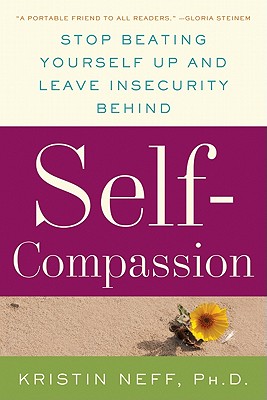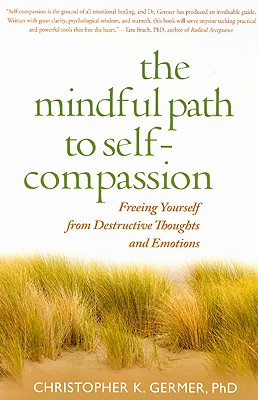*If you are interested in this program, please fill out this form to be added to the interest list. We will contact you once this program is scheduled.
Course Description
How do you typically react to difficulties in life—work stress, feeling rejected, physical problems, or financial hardship? As human beings, most of us instinctively fight negative experiences and find fault in ourselves when things go wrong: “This shouldn’t be happening!” “What’s the matter with me!?” Unfortunately, this tendency just adds stress to our lives and the critical self-talk defeats us before we know what’s happening. For example, the more we struggle to fall asleep, the harder it is to sleep; fighting with anxiety makes us feel worried all the time; and blaming ourselves for feeling bad just makes us depressed. But what would happen if, instead, you took a moment to calm and comfort yourself when you felt bad, just because you felt bad—much like you’d do for others? In other words, what if you learned the art of mindful self-compassion?
Self-compassion is a skill that can be learned by anyone, even those who didn’t receive enough affection in childhood or who find it embarrassing to be kind to themselves. Self-compassion is actually a courageous mental attitude that stands up to harm—the harm that we inflict on ourselves every day by overworking, overeating, overanalyzing, and overreacting. With mindful self-compassion, we’re better able to recognize when we’re under stress and face what’s happening in our lives (mindfulness) and to take a kinder and more sustainable approach to life’s challenges. Self-compassion gives emotional strength and resilience, allowing us to recover more quickly from bruised egos to admit our shortcomings, forgive ourselves, and respond to ourselves and others with care and respect. After all, making mistakes is part of being human. Self-compassion also provides the support and inspiration required to make necessary changes in our lives and reach our full potential.
Research has shown that self-compassion greatly enhances emotional well-being. It boosts happiness, reduces anxiety and depression, and can even help you stick to your diet and exercise routine. And it’s easier than you think. Most of us feel compassion when a close friend is struggling. What would it be like to receive the same caring attention whenever you needed it most? All that’s required is shift in the direction of our attention—recognizing that as a human being, you, too, are a worthy recipient of compassion.
At the completion of this activity, participants should be able to:
- describe the theory and research supporting mindful self-compassion
- motivate themselves with encouragement rather than self-criticism
- relate to difficult emotions with greater moment-to-moment acceptance
- respond to feelings of failure or inadequacy with self-kindness
- begin to transform difficult relationships, old and new, through self-validation
- practice the art of savoring and self-appreciation
- integrate core mindfulness and self-compassion exercises into daily life
- teach simple self-compassion practices to patients, students, or clients
8-Week Course in Mindful Self-Compassion

 Mindful Self-Compassion (MSC) is a program developed by Kristin Neff, the pioneering researcher in the field of self-compassion (www.Self-Compassion.org ) and the author of Self-Compassion: Stop Beating Yourself Up and Leave Insecurity Behind; and Christopher Germer, a clinical psychologist who specializes in mindfulness and compassion-based psychotherapy (https://chrisgermer.com) and the author of many books including A Mindful Path to Self-Compassion.
Mindful Self-Compassion (MSC) is a program developed by Kristin Neff, the pioneering researcher in the field of self-compassion (www.Self-Compassion.org ) and the author of Self-Compassion: Stop Beating Yourself Up and Leave Insecurity Behind; and Christopher Germer, a clinical psychologist who specializes in mindfulness and compassion-based psychotherapy (https://chrisgermer.com) and the author of many books including A Mindful Path to Self-Compassion.
In this program, you will learn:
- How to stop being so hard on yourself
- How to handle difficult emotions with greater ease
- How to motivate yourself with encouragement rather than criticism
- How to transform difficult relationships, both old and new
- Mindfulness and self-compassion practices for home and everyday life
- The theory and research behind mindful self-compassion
- How to become your own best teacher
The Mindful Self-Compassion program is offered in two different formats for the maximum flexibility:
The 8-week format - consists of 8 weekly, 3 -hour sessions with 15 min breaks in a classroom/discussion group format, plus a 4-hour retreat. This class is often most easily integrated into our lives and offers an extended opportunity to deepen and solidify our practice.
The 5-day format - consists of a 5-day intensive in a retreat format. The course is typically offered in a retreat setting and offers the ability to learn self-compassion while taking time away from our ordinary stressors and immersing ourselves in practice. For more information, refer to the 5-day MSC Intensive Information Page or if you are interested in taking the program, please see the schedule page here.
8-week MSC Course Fees
Within 30 days of the program start date, full payment must be made. All fees must be paid in order to attend the first session of the program.
$595 ($545 if you pay in full 30 days in advance for the course).
Please Note: Those who have completed a UC San Diego Mindfulness-Based Stress Reduction (MBSR) program can receive a $50 discount on the 8-Day MSC Program or the 5-Day MSC Intensive Training Program. (Not applicable for Introduction to MSC Workshop, SC-MSC, or 2-Day MSC Core Skills Workshop.) Please email us (mindfulness@health.ucsd.edu) before you register to receive your discount code.
UC SAN DIEGO EMPLOYEE DISCOUNT
UC San Diego Employees may take the course for $545 (or $495 if you pay in full 30 days prior to the start of class).
Continuing Education and the Certificate of Completion
Certificate of Completion: you must attend at least 6 out of the 8 weeks of the program and attend the Half-Day Session in order to receive the Certificate of Completion. Once you complete the survey at the end of the program, please email us at mindfulness@health.ucsd.edu for the certificate.
CE Credits: this certificate is an additional $50 fee for CE credits. You must attend ALL sessions and the Half-Day Session in order to receive the certificate.
Continuing education credits are awarded in the following categories: American Psychological Association (APA) and Board of Registered Nursing (BRN).
Psychologists: UC San Diego Center for Mindfulness is approved by the American Psychological Association to sponsor continuing education for psychologists. The UC San Diego Center for Mindfulness maintains responsibility for this program and its content. 24.0 CE credit.
California licensed MFTs, LPCCs, LEPs, LCSWs: This activity is an approved continuing education program by the American Psychological Association. Credit hours may be applied to your license renewal through the California Board of Behavioral Sciences. 24.0 CE credit.
Nurses: UC San Diego Center for Mindfulness is approved by the California Board of Registered Nursing to sponsor continuing education. Provider Number CEP16351. 28.5 contact hours.
Cancellation Policy
A refund of your registration payment (minus your $50 non-refundable/non-transferable deposit) will be made for participants who withdraw prior to the start of the 1st class by emailing mindfulness@health.ucsd.edu.
If you decide to cancel after the 1st session and before the 2nd session starts, 50% of your registration payment will be refunded. No refunds will be made after the 2nd session starts.
Please be aware that the registration fee, deposits, and funds are non-transferable to other programs.
In the unlikely event that the course is cancelled, UC San Diego Center for Mindfulness is responsible only for a full refund of the registration fee. In regards to the In-Person Programs, the center is not responsible for any refunds to transportation, hotel accommodations, or any miscellaneous expenses.
The refunds are processed in the same method as the payments were submitted (unless past 180 days).
Note: CFM requires a minimum of 10 registrants per program. Classes with fewer than 10 participants will be cancelled and provided a refund. Please be aware of this when making arrangements to attend this program.

